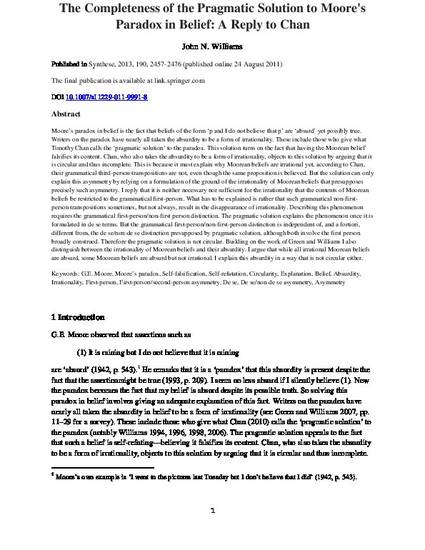
Moore’s paradox in belief is the fact that beliefs of the form ‘p and I do not believe that p’ are ‘absurd’ yet possibly true. Writers on the paradox have nearly all taken the absurdity to be a form of irrationality. These include those who give what Timothy CHAN calls the ‘pragmatic solution’ to the paradox. This solution turns on the fact that having the Moorean belief falsifies its content. CHAN, who also takes the absurdity to be a form of irrationality, objects to this solution by arguing that it is circular and thus incomplete. This is because it must explain why Moorean beliefs are irrational yet, according to CHAN, their grammatical third-person transpositions are not, even though the same proposition is believed. But the solution can only explain this asymmetry by relying on a formulation of the ground of the irrationality of Moorean beliefs that presupposes precisely such asymmetry. I reply that it is neither necessary nor sufficient for the irrationality that the contents of Moorean beliefs be restricted to the grammatical first-person. What has to be explained is rather that such grammatical non-first-person transpositions sometimes, but not always, result in the disappearance of irrationality. Describing this phenomenon requires the grammatical first-person/non-first person distinction. The pragmatic solution explains the phenomenon once it is formulated in de se terms. But the grammatical first-person/non-first-person distinction is independent of, and a fortiori, different from, the de se/non-de se distinction presupposed by pragmatic solution, although both involve the first person broadly construed. Therefore the pragmatic solution is not circular. Building on the work of Green and Williams I also distinguish between the irrationality of Moorean beliefs and their absurdity. I argue that while all irrational Moorean beliefs are absurd, some Moorean beliefs are absurd but not irrational. I explain this absurdity in a way that is not circular either.
- G.E. Moore,
- Moore’s paradox,
- Self-falsification,
- Self-refutation,
- Circularity,
- Explanation,
- Belief,
- Absurdity,
- Irrationality,
- First-person,
- First-person/second-person asymmetry,
- De se,
- De se/non-de se asymmetry,
- Asymmetry
Available at: http://works.bepress.com/john_williams/81/
